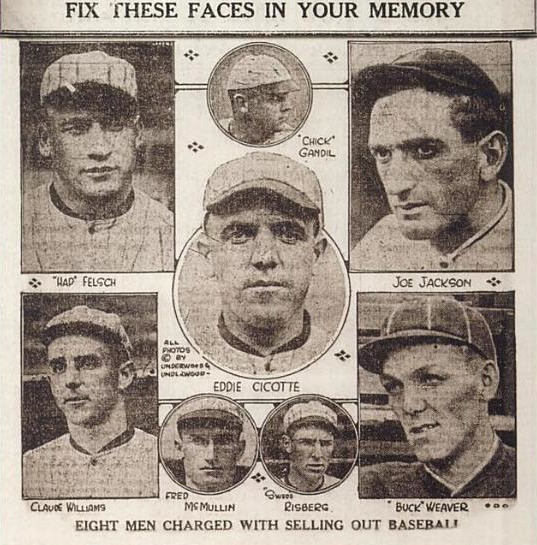
Source: Anderson, Wayne (2004) “The Fix” in The Chicago Black Sox Trial: A Primary Source Account, Great Trials of the Twentieth Century, New York, United States: The Rosen Publishing Group
Public Domain via Wikimedia Commons
The 1919 World Series between the Chicago White Sox and the Cincinnati Reds has been forever tainted by allegations that the game was thrown by some White Sox team members being paid by a gambling syndicate being run by Arthur Rothstein. The scandal changed baseball forever resulting in imposition of new rules of player conduct and putting into power a baseball commissioner who would preside like a dictator over baseball for decades. So, what happened? Let’s find out.
The White Sox were heavily favored to win the game in 1919 but many players were upset with being underpaid by team owner Charles Comiskey. It is believed that first baseman Chick Gindil may have initiated contact and through intermediaries New York gambler Arnold Rothstein offered money for the players to lose some of the games intentionally. Rumors of game fixing began on the first day of the game (1 Oct 1919). A lot of money was being placed against the Reds, which raised suspicions. The rumors reached the press box which started getting sports writers interested. As the games went on, plays were being watched more carefully and what the players were doing (or rather, not doing right). By Game 5 though, those involved were upset that they had not be paid and won Games 6 and 7. The gamblers struck back, and threats were made against the players and the families. Game 8 was lost by the Sox ending the series. The main conspirators received $5,000 each with Chick Gandil, who was the one who initiated the scheme, receiving $35,000.
Rumors swirled into the 1920 season and newspaper stories of corruption in other ball clubs emerged as well. Finally what appeared to be a rigged regular season game between the Cubs and the Phillies in August 1920 led to a grand jury being convened in September to investigate the 1919 World Series. Pitcher Eddie Cicotte confessed to his role and signed a waiver of immunity. Shoeless Joe Jackson soon testified to receiving $5,000 from his teammates. Lefty Williams and Oscar Felsch also confessed as well. In October indictments for conspiracy were handed down for seven members of the White Sox, forever dubbed the Black Sox:
- Arnold “Chick” Gandil (1st Base)
- Eddie Cicotte (Pitcher)
- Claude “Lefty” Williams (Pitcher)
- Charles “Swede” Risberg (Shortstop)
- Oscar “Happy” Felsch (Outfielder)
- “Shoeless” Joe Jackson (Outfielder)
- Fred McMullin (Infielder)
- Buck Weaver ( 3rd Base)
The media and the public were unforgiving. Numerous stories appeared on how they sold out baseball and baseball fans over what happened. It was a major public relations nightmare for both the American and National leagues (back then they were separate unlike today). The trial took a mysterious turn when signed confessions and other documents mysteriously disappeared from the Cook County Courthouse. Both Cicotte and Jackson retracted their confessions, and without direct evidence what the jury heard were second hand or hearsay accounts. White Sox player “Sleepy Bill” Burns gave the most damning testimony when he said that Rothstein was involved and Cicotte had said he would fix the game. White Sox owner Charles Comiskey, who many felt had mistreated his players by not paying his player enough and not paying promised bonuses, was grilled on the stand so hard by the defense counsel that he became enraged. The jury got the case on 28 Jul and returned with a not guilty verdict three hours later.
Baseball Owners Respond
Prior to the jury verdict and even before the scandal broke out, the baseball team owners wanted to change how things were run. A National Commission governed the sport, but they realized things had to change. One suggestion was to get a recognized federal judge to sit on this commission and help direct baseball in a better direction. They looked at noted baseball fan and federal judge Kenesaw Mountain Landis, but he demanded that he be made sole commissioner with nearly unchecked powers as commissioner. Although there were misgivings, the baseball owners agreed to his demands and made him the sole commissioner. This was unheard of back then as usually you wanted power vested in a group rather than one person. Landis would rule baseball from 1920-1944 and he would rule it with an iron fist. He would be the first and the last commissioner to have unchecked powers as he did.
Commissioner Landis Sets a New Tone for Baseball
Landis speaking at a church in 1921 is reported as saying he would tolerate any crooks in baseball.
Now that I am in baseball, just watch the game I play. If I catch any crook in baseball, the rest of his life is going to be a pretty hot one. I’ll go to any means and to anything possible to see that he gets a real penalty for his offense.
Like everyone else, he watched how the federal trial was going on against the White Sox players. When evidence disappeared requiring some charges to be dropped and new ones added (McMullin was dropped in the new charges), Landis responded by putting all eight on the ineligible list, banning them from major and minor league baseball. Comiskey released the seven who still were under contract, so they were effectively barred from professional baseball. However, Jackson, Williams, Felsch, and Weaver were able to play in a semi-pro game though sports writers heavily criticized it and the public for attending.
The acquittal seemed to end it and everyone in a celebratory mood afterwards. Both players and the jury went to an Italian restaurant and celebrated, it is said, long into the night. Their joy was short lived though. The following day (3 Aug 1921) Commissioner Landis issued the following statement:
Regardless of the verdict of juries, no player that throws a ball game; no player that undertakes or promises to throw a ball game; no player that sits in a conference with a bunch of crooked players and gamblers where the ways and means of throwing ball games are planned and discussed and does not promptly tell his club about it, will ever play professional baseball. Of course, I don’t know that any of these men will apply for reinstatement, but if they do, the above are at least a few of the rules that will be enforced. Just keep in mind that, regardless of the verdict of juries, baseball is competent to protect itself against crooks, both inside and outside the game.
With that statement, Landis set a standard that still applies to this day. No ball player who colludes with gamblers or promises to throw a ball game is going to find a home in baseball. And even if a jury acquits them, baseball is the final arbiter of who can and cannot play. Now one can argue that if a person is legally acquitted of a crime of conspiracy to throwing a game, he should be welcomed back. Except that Landis knew, as did others, that there were signed confessions out there that mysteriously disappeared, and they recanted confessions after they vanished. The jury never got to see those confessions, which likely would have made a difference in the outcome. Unlike someone who steadfastly says he is innocent and is proven at trial that someone else was, the evidence here was certainly conclusive that they had conspired to through the game for gamblers.
Landis refused to reinstate any of the eight even with a lot of support and statements that perhaps they had been misled, their baseball stats from the games showed they had not thrown the games, or other reasons. To this day their expulsions stand despite sympathy for Jackson and Weaver. Landis moved to crack down on any association with gambling. Two team owners who had purchased a racing horse track had to sell it. Other baseball players who associated themselves in any way with gamblers or gambled on the game were struck off and out of the game. Also playing baseball outside of the season for pay was discouraged without permission from Landis.
Babe Ruth got into hot water with Landis for not getting his permission and for a while made him ineligible to play again for the Yankees until Landis met with him. Landis was also strict with the team owners making them disclose holdings they had in minor leagues and to honor their contracts with players. He was not a fan of the farm system, but it has become the way most teams develop promising players for the major leagues. While apparently a liberal on racial matters, he upheld the unofficial ban on black ballplayers playing in professional baseball and forbade teams from playing black baseball teams (though it was done unofficially). While it is debatable how racist Landis was, there were indications many players were and would not tolerate nor accept a black ballplayer. Perhaps, and this is not an excuse for his actions, Landis feared ugly incidents in the club house that would do more damage to the sport than gambling did.
Sources
Andrews, E., & Andrews, E. (2023, August 24). What was the 1919 ‘Black Sox’ baseball scandal? HISTORY. https://www.history.com/news/black-sox-baseball-scandal-1919-world-series-chicago
The Editors of Encyclopaedia Britannica. (2024b, June 21). Black Sox Scandal of 1919 | Summary, trial, players, & facts. Encyclopedia Britannica. https://www.britannica.com/event/Black-Sox-Scandal
Lamb, B. (2022, September 14). The Black Sox scandal. https://sabr.org/journal/article/the-black-sox-scandal/
Wikipedia contributors. (2024b, June 26). Black Sox scandal. Wikipedia. https://en.wikipedia.org/wiki/Black_Sox_Scandal
